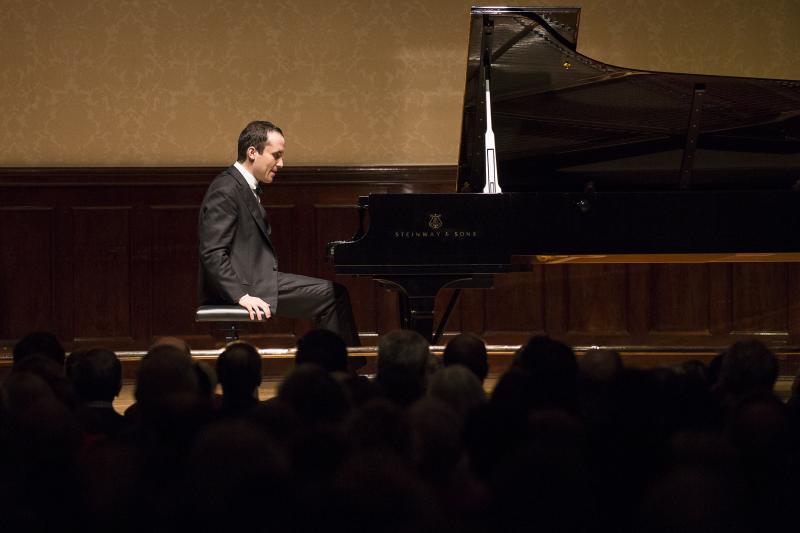Igor Levit, Wigmore Hall review – music for the ages | reviews, news & interviews
Igor Levit, Wigmore Hall review – music for the ages
Igor Levit, Wigmore Hall review – music for the ages
New work for Rzewski’s 80th a puzzling affair but performed with dedication and authority

Frederic Rzewski marked his 80th birthday with a visit to the Wigmore Hall, for the premiere of his aptly titled Ages.
Rzewski (pictured below) has always been an eclectic composer, taking styles and ideas, from historical allusions to post-tonal harmonies, and combining them into lively and virtuosic piano works. Ages continues that tradition, but now the disparate strands seem to be pulling in different directions, the style unsettled and erratic. Brief quotes appear, but are immediately subsumed back into the texture: the B-A-C-H monogram is a leitmotif, and the music continually returns to cadential figures from The Well-Tempered Clavier, but we also hear snatches of the Grosse Fuge, The Rite of Spring – all the usual suspects. Most surprisingly, the tight construction and virtuosic passagework of Rzewski’s earlier music here gives way to slow-moving textures, only occasionally coalescing into rhythmically focused episodes. On top of all this, Rzewski adds a range of extended techniques and sound effects. The work begins with the lid being slammed down on the keys with the sustain pedal down, and on regular occasions later on, the lid is again closed, for Levit to tap rhythmically. He also sings, or rather moans under his breath, and plays musical toys – a cow moo canister, a duck call, some electronic explosion sound effects.  What does it all mean? Rzewski tells us in his nebulous programme note that “the music does not ‘mean’ anything”, although he makes a vague connection between the sound effects and the ages of man, and the historical allusions to the ages of history. But the overall impression is of freely rhapsodic writing, with little concern for proportion or direction, the composer luxuriating in the glorious pianism of his dedicated performer. It held the capacity Wigmore audience in rapt and silent concentration for its full hour, a testament, no doubt, to Levit’s gift for musical theatre as much as to the score itself.
What does it all mean? Rzewski tells us in his nebulous programme note that “the music does not ‘mean’ anything”, although he makes a vague connection between the sound effects and the ages of man, and the historical allusions to the ages of history. But the overall impression is of freely rhapsodic writing, with little concern for proportion or direction, the composer luxuriating in the glorious pianism of his dedicated performer. It held the capacity Wigmore audience in rapt and silent concentration for its full hour, a testament, no doubt, to Levit’s gift for musical theatre as much as to the score itself.
Three Mendelssohn Songs Without Words opened the second half. Levit’s sense of melodic line shone here, his rubato broad and uninhibited, offering generous phrasing. His left hand was heavy, though, in the accompanying figures, more a succession of notes than the required blend. Fortunately, that combination of heavy bass and floating melody proved perfect for the final work, Ronald Stevenson’s piano transcription of the Adagio first movement of Mahler’s Tenth Symphony. Stevenson gives a modest account of Mahler’s orchestral textures, rarely employing tremolos or large broken chords to replicate the sonorities, and instead relying on the distinctive harmonic progressions to convey the atmosphere.
Like the Rzewski, this score seemed custom-made for Levit’s brand of pianism. The unaccompanied viola opening demonstrated both his luminous touch and his intuitive feel for phrase shaping. Levit’s ability to maintain a sense of atmosphere across long spans was also invaluable, especially as Stevenson often leaves the slow-moving chord progressions unadorned and at the mercy of the piano’s decay. But that was never a problem, as Levit patiently guided the ear through the harmonic labyrinth. And the ending was ideal, the final statements of the melody bathed in a subdued glow of quiet but immaculately voiced harmony. Exquisite.
rating
Share this article
The future of Arts Journalism
You can stop theartsdesk.com closing!
We urgently need financing to survive. Our fundraising drive has thus far raised £49,000 but we need to reach £100,000 or we will be forced to close. Please contribute here: https://gofund.me/c3f6033d
And if you can forward this information to anyone who might assist, we’d be grateful.

Subscribe to theartsdesk.com
Thank you for continuing to read our work on theartsdesk.com. For unlimited access to every article in its entirety, including our archive of more than 15,000 pieces, we're asking for £5 per month or £40 per year. We feel it's a very good deal, and hope you do too.
To take a subscription now simply click here.
And if you're looking for that extra gift for a friend or family member, why not treat them to a theartsdesk.com gift subscription?
more Classical music
 Robin Holloway: Music's Odyssey review - lessons in composition
Broad and idiosyncratic survey of classical music is insightful but slightly indigestible
Robin Holloway: Music's Odyssey review - lessons in composition
Broad and idiosyncratic survey of classical music is insightful but slightly indigestible
 Classical CDs: Wolf-pelts, clowns and social realism
British ballet scores, 19th century cello works and contemporary piano etudes
Classical CDs: Wolf-pelts, clowns and social realism
British ballet scores, 19th century cello works and contemporary piano etudes
 Bizet in 150th anniversary year: rich and rare French offerings from Palazzetto Bru Zane
Specialists in French romantic music unveil a treasure trove both live and on disc
Bizet in 150th anniversary year: rich and rare French offerings from Palazzetto Bru Zane
Specialists in French romantic music unveil a treasure trove both live and on disc
 Scottish Chamber Orchestra, Ibragimova, Queen’s Hall, Edinburgh review - rarities, novelties and drumrolls
A pity the SCO didn't pick a better showcase for a shining guest artist
Scottish Chamber Orchestra, Ibragimova, Queen’s Hall, Edinburgh review - rarities, novelties and drumrolls
A pity the SCO didn't pick a better showcase for a shining guest artist
 Kilsby, Parkes, Sinfonia of London, Wilson, Barbican review - string things zing and sing in expert hands
British masterpieces for strings plus other-worldly tenor and horn - and a muscular rarity
Kilsby, Parkes, Sinfonia of London, Wilson, Barbican review - string things zing and sing in expert hands
British masterpieces for strings plus other-worldly tenor and horn - and a muscular rarity
 From Historical to Hip-Hop, Classically Black Music Festival, Kings Place review - a cluster of impressive stars for the future
From quasi-Mozartian elegance to the gritty humour of a kitchen inspection
From Historical to Hip-Hop, Classically Black Music Festival, Kings Place review - a cluster of impressive stars for the future
From quasi-Mozartian elegance to the gritty humour of a kitchen inspection
 Shibe, LSO, Adès, Barbican review - gaudy and glorious new music alongside serene Sibelius
Adès’s passion makes persuasive case for the music he loves, both new and old
Shibe, LSO, Adès, Barbican review - gaudy and glorious new music alongside serene Sibelius
Adès’s passion makes persuasive case for the music he loves, both new and old
 Anja Mittermüller, Richard Fu, Wigmore Hall review - a glorious hall debut
The Austrian mezzo shines - at the age of 22
Anja Mittermüller, Richard Fu, Wigmore Hall review - a glorious hall debut
The Austrian mezzo shines - at the age of 22
 First Person: clarinettist Oliver Pashley on the new horizons of The Hermes Experiment's latest album
Compositions by members of this unusual quartet feature for the first time
First Person: clarinettist Oliver Pashley on the new horizons of The Hermes Experiment's latest album
Compositions by members of this unusual quartet feature for the first time
 Gesualdo Passione, Les Arts Florissants, Amala Dior Company, Barbican review - inspired collaboration excavates the music's humanity
At times it was like watching an anarchic religious procession
Gesualdo Passione, Les Arts Florissants, Amala Dior Company, Barbican review - inspired collaboration excavates the music's humanity
At times it was like watching an anarchic religious procession
 Classical CDs: Camels, concrete and cabaret
An influential American composer's 90th birthday box, plus British piano concertos and a father-and-son duo
Classical CDs: Camels, concrete and cabaret
An influential American composer's 90th birthday box, plus British piano concertos and a father-and-son duo
 Cockerham, Manchester Camerata, Sheen, Martin Harris Centre, Manchester review - re-enacting the dawn of modernism
Two UK premieres added to three miniatures from a seminal event of January 1914
Cockerham, Manchester Camerata, Sheen, Martin Harris Centre, Manchester review - re-enacting the dawn of modernism
Two UK premieres added to three miniatures from a seminal event of January 1914

Add comment